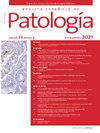Comparison of B-cell lymphoma 2 (BCL-2) expression in disordered proliferative endometrium and simple endometrial hyperplasia
IF 0.5
Q4 Medicine
引用次数: 0
Abstract
Background and objective
B-cell lymphoma-2 (BCL-2) is an anti-apoptotic protein that may play a role in disordered proliferative endometrium (DPE) and endometrial hyperplasia (EH). Several studies have investigated BCL-2 expression in normal, hyperplastic endometrium and endometrial adenocarcinoma, with conflicting results. Therefore, the present study aimed to compare the expression of BCL-2 in disordered proliferative endometrium and simple EH.
Methods
In this cross-sectional study, 63 DPE and 67 SEH samples from patients referred to Mostafa Khomeini Hospital between 2017 and 2022 were immunohistochemically stained by BCL-2 antibody. BCL-2 expression in each sample was reported as negative, weak positive, and strong positive. The findings were analyzed using SPSS version 16 software.
Results
Negative, weakly positive, and strongly positive BCL-2 expression was observed in 55.6%, 38.1%, and 6.3% of DPE samples, and 61.2%, 31.3%, and 7.5% of SEH samples, respectively, which does not show a statistically significant difference (p = 0.718). There was no relationship between the age of patients and BCL-2 expression in any of the two groups of DPE and SEH (p = 0.378 and p = 0.178, respectively).
Conclusion
BCL-2 expression is observed with a relatively similar frequency in DPE and SEH samples, and it is probably under the control of oestrogen hormone as the main factor involved in the pathogenesis of these lesions.
B 细胞淋巴瘤 2 (BCL-2) 在增生紊乱性子宫内膜和单纯性子宫内膜增生症中的表达比较
背景和目的B细胞淋巴瘤-2(BCL-2)是一种抗凋亡蛋白,可能在增生紊乱的子宫内膜(DPE)和子宫内膜增生症(EH)中发挥作用。一些研究调查了 BCL-2 在正常子宫内膜、增生性子宫内膜和子宫内膜腺癌中的表达,但结果相互矛盾。因此,本研究旨在比较BCL-2在无序增生子宫内膜和单纯EH中的表达情况。方法在这项横断面研究中,对2017年至2022年期间转诊至Mostafa Khomeini医院的63例DPE和67例SEH患者样本进行了BCL-2抗体免疫组化染色。每个样本中的 BCL-2 表达分为阴性、弱阳性和强阳性。结果分别有55.6%、38.1%和6.3%的DPE样本和61.2%、31.3%和7.5%的SEH样本观察到BCL-2表达阴性、弱阳性和强阳性,差异无统计学意义(P = 0.718)。在 DPE 和 SEH 两组样本中,患者的年龄与 BCL-2 的表达均无关系(分别为 p = 0.378 和 p = 0.178)。
本文章由计算机程序翻译,如有差异,请以英文原文为准。
求助全文
约1分钟内获得全文
求助全文
来源期刊

Revista Espanola de Patologia
Medicine-Pathology and Forensic Medicine
CiteScore
0.90
自引率
0.00%
发文量
53
审稿时长
34 days
 求助内容:
求助内容: 应助结果提醒方式:
应助结果提醒方式:


